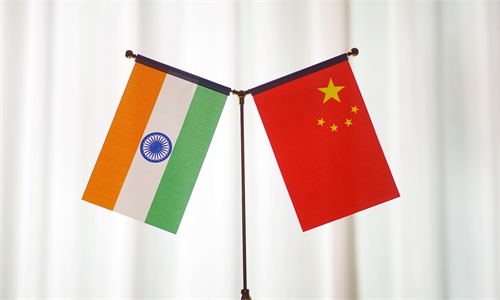
Illustration: Xia Qing/Global Times
India is suffering rising loss and damage owing to climate change. The large investments required to fight extreme weather ought to be supported by the world's wealthy nations through a loss and damage financing facility, the India delegation told representatives of rich countries at the climate change conference in Bonn, Germany, where officials are meeting to prepare for the next UN climate conference in November in Egypt, the Guardian reported on Tuesday.Large parts of India have been stifled by an unprecedented heat wave over the past two months. Climate change has made record-breaking heat waves in northwest India and Pakistan 100 times more likely, the BBC reported in May. Increasingly, global warming prompts New Delhi to become an active participant at global climate talks.
The US retains the first position in the world for cumulative emissions of greenhouse gases. Taking a U-turn from the attitude of former US President Donald Trump, who made the decision to withdraw the US from the Paris Climate Agreement, US President Joe Biden has set an ambitious goal of reducing greenhouse gases by 50-52 percent by 2030.
This set target is commendable, but it does not necessarily mean the US will be willing to pay for climate disasters caused by its cumulative carbon dioxide emissions and provide financial assistance to developing countries like India to help them tackle climate change.
Instead, the US may try to reestablish itself as a global loudspeaker on climate change while criticizing fast-growing emerging market economies like India, which record increased carbon emissions due to industrialization, though those countries have also vowed to take effective measures to tackle climate change.
New Delhi has pledged to achieve net-zero carbon emissions by 2070, and China aims to have carbon dioxide emissions peak before 2030 and achieve carbon neutrality before 2060. Developing economies still face a major task of raising people's living standards through vigorous development, which may make it harder for them to cut carbon emissions compared with the wealthy nations.
However, the efforts of the developing countries to grow their economies failed to win applause but questioning and critique from the West. Western politicians have been keen on hyping up China and India's role as the world's major greenhouse gas emitters, and deliberately overlooked their attempts to reduce carbon emissions.
China and India jointly asked the developed countries to provide financing to emerging market economies to help reduce their own carbon emissions in 2015, but their call has fallen on deaf ears, according to media reports.
In this regard, the emerging market economies have more common interests than their divergences in tackling climate changes and building a clean economy. Striking a balance between ambitious emissions reduction targets and industrialization, the emerging market economies must pursue development paths different from those adopted by the West. The green economy is the only way out.
Building a clean economy will lead to more advanced scientific and technological developments, facilitating the growth of strategic emerging industries. Developing countries, including China and India, have common ground upon which they can expand economic cooperation.
According to a statement jointly released by 17 Chinese departments including the Ministry of Ecology and Environment, China aims to "basically" build a "climate-resilient society" by 2035. The country's climate change monitoring and early warning capability will reach an advanced level by 2035, while the climate risk management and prevention system will basically mature then, the Xinhua News Agency reported Tuesday. The development of a "climate-resilient society" means a huge market and abundant business opportunities.
The emerging markets are thriving. However, if each of the developing nations stands on its own feet, their influence will remain weak on the international stage. Emerging market economies need to collaborate to build a climate-resilient economy and share market opportunities via framework such as BRICS and BRICS Plus. It will bring more benefits than funds which the wealthy countries are reluctant to pay.
The author is a reporter with the Global Times. bizopinion@globaltimes.com.cn


